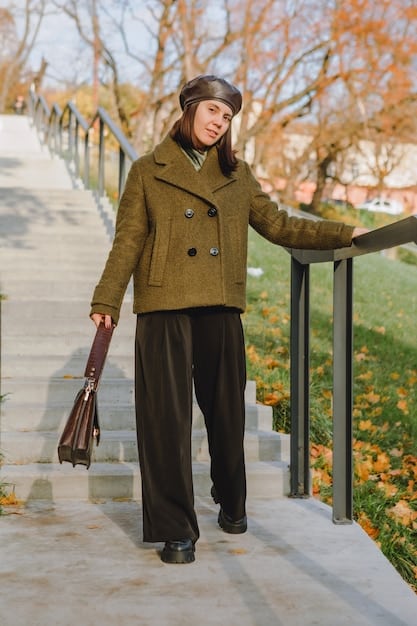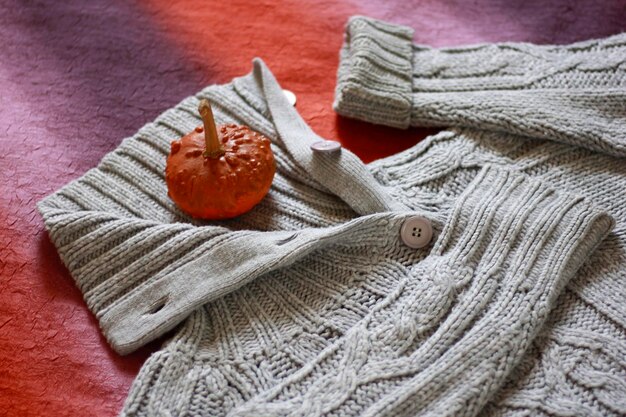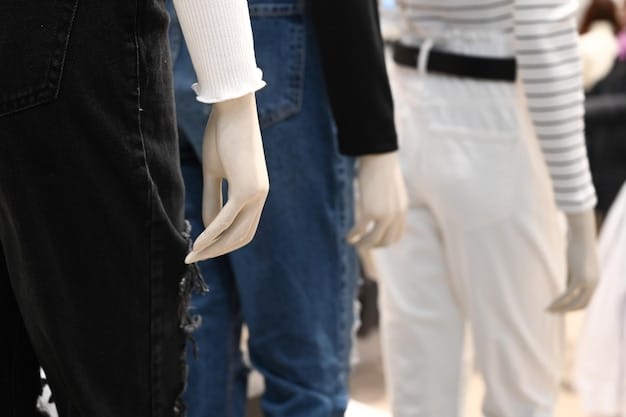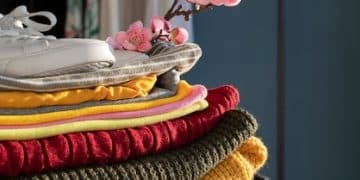Mastering the Art of Layering: Create Stylish Outfits with Key Pieces (US Edition)

Advertisements
Mastering the art of layering is an essential skill for creating versatile and stylish outfits with a few key pieces, allowing you to adapt to changing weather and express your personal style in the US.
Mastering the art of layering: Create multiple outfits with a few key pieces (US Edition) empowers you to maximize your wardrobe, stay comfortable in fluctuating temperatures, and express your unique style without breaking the bank.
Advertisements
Why Layering is Essential for US Fashion
In the US, where weather can change dramatically in a single day, layering becomes more than just a fashion statement—it’s a practical necessity. Understanding how to layer effectively allows you to adapt your outfit to different temperatures and settings without sacrificing style.
Adapting to US Climates
From the warm summers of the South to the freezing winters of the North, the US presents a diverse range of climates. Layering allows you to effortlessly transition between these extremes.
Advertisements
Maximizing Your Wardrobe
By combining a few key pieces in creative ways, you can create a multitude of outfits. This not only saves money but also allows you to express your individual style with the clothes you already own.
- Start with a base layer like a lightweight long-sleeve shirt or a breathable tank top.
- Add a mid-layer such as a sweater, cardigan, or denim jacket for warmth and style.
- Finish with an outer layer like a coat, trench, or puffer jacket for protection against the elements.
Layering is about creating a cohesive look that is both functional and fashionable. By carefully selecting your pieces and understanding how they work together, you can create outfits that are versatile, stylish, and perfectly suited to the US climate.
Essential Pieces for a Layered Wardrobe
Building a versatile layered wardrobe starts with investing in key pieces that can be mixed and matched to create a variety of outfits. These essentials will serve as the foundation for your layered looks, allowing you to adapt to different occasions and weather conditions.

Base Layers: The Foundation of Your Outfit
Base layers are the foundation of any layered outfit, providing comfort and insulation against the skin. Opt for lightweight materials like cotton, merino wool, or silk that are breathable and moisture-wicking.
Mid-Layers: Adding Warmth and Style
Mid-layers add warmth and style to your outfit, allowing you to adjust your look to changing temperatures. Choose pieces like sweaters, cardigans, denim jackets, or vests in a variety of textures and colors.
- Turtleneck shirts: A classic base layer that adds warmth and sophistication.
- Lightweight sweaters: Versatile mid-layers that can be dressed up or down.
- Denim jackets: A casual yet stylish option for transitional weather.
These essential pieces will form the core of your layered wardrobe, allowing you to create countless outfit combinations that are both practical and stylish. By investing in quality items that can be mixed and matched, you can master the art of layering and elevate your fashion game.
Color and Texture Combinations for Layered Outfits
Understanding color and texture combinations is crucial for creating visually appealing and cohesive layered outfits. By carefully selecting your pieces, you can create looks that are both stylish and harmonious.
Playing with Colors
Color is a powerful tool that can be used to create different moods and effects. Experiment with combining complementary colors, analogous colors, or monochromatic shades to add depth and interest to your layered outfits.
Mixing Textures
Texture adds another layer of dimension to your outfits, creating visual interest and tactile appeal. Mix different textures like knits, denim, leather, and silk to create a dynamic and engaging look.
- Complementary colors: Pair colors that are opposite each other on the color wheel, such as blue and orange, for a bold and vibrant look.
- Analogous colors: Combine colors that are next to each other on the color wheel, such as blue, teal, and green, for a harmonious and sophisticated look.
- Monochromatic shades: Layer different shades of the same color, such as light gray, medium gray, and charcoal, for a sleek and modern look.
By experimenting with different color and texture combinations, you can create layered outfits that are both stylish and unique. Don’t be afraid to try new things and push the boundaries of your fashion comfort zone.
Layering for Different Occasions
Layering isn’t just about staying warm; it’s also a versatile way to adapt your style to different occasions. From casual outings to formal events, layering can help you create the perfect outfit for any situation.
Casual Outings
For casual outings, focus on comfort and practicality. Combine comfortable base layers with cozy mid-layers like sweaters or cardigans, and finish with a casual outer layer like a denim jacket or bomber.
Work or Business Casual
For work or business casual settings, opt for more polished and professional layers. Pair a button-down shirt with a blazer or cardigan, and finish with a trench coat or tailored jacket.

- Pair a basic t-shirt with a denim jacket and a scarf for a casual yet stylish look.
- Layer a button-down shirt with a sweater and a blazer for a polished office ensemble.
- Add a statement necklace to a dress and layer with a cardigan for an evening event.
By carefully selecting your pieces and considering the occasion, you can master the art of layering and create outfits that are both appropriate and stylish.
Budget-Friendly Layering Tips
Layering doesn’t have to break the bank. With a few strategic shopping tips and creative styling tricks, you can master the art of layering on a budget and create a versatile wardrobe that suits your style and needs.
Thrift Store Finds
Thrift stores are a treasure trove of unique and affordable layering pieces. Browse the racks for vintage sweaters, denim jackets, and scarves that can add character to your outfits.
Sales and Discounts
Keep an eye out for sales and discounts at your favorite retailers. Stock up on basics like t-shirts, tank tops, and leggings when they’re on sale, and invest in quality outerwear during end-of-season clearances.
- Shop off-season: Purchase winter coats and sweaters during the summer months to take advantage of discounted prices.
- Utilize online coupons: Search for online coupon codes and promo codes before making a purchase to save even more money.
- Shop at outlet stores: Outlet stores offer discounted prices on designer and brand-name clothing, making them a great resource for finding layering essentials.
By following these budget-friendly layering tips, you can create a stylish and versatile wardrobe without spending a fortune. Remember to focus on quality over quantity and invest in timeless pieces that can be mixed and matched for years to come.
Maintaining Your Layered Outfits
Proper care and maintenance are essential for preserving the quality and longevity of your layered outfits. Follow these tips to keep your clothing looking its best and ensure that your layered looks remain stylish for years to come.
Washing and Drying
Follow the care instructions on each garment to ensure proper washing and drying. Hand-wash delicate items like silk scarves and wool sweaters, and machine-wash more durable items like denim jackets and cotton t-shirts.
Storage and Organization
Store your layered pieces in a cool, dry place to prevent damage from moisture and sunlight. Use garment bags to protect delicate items from dust and moths, and organize your closet by color or style to make it easier to find what you need.
- Use cedar blocks or sachets to repel moths and protect your wool and cashmere items.
- Fold sweaters and knitwear to prevent stretching and maintain their shape.
- Hang coats and jackets on sturdy hangers to prevent wrinkles and maintain their structure.
By following these maintenance tips, you can extend the life of your layered outfits and enjoy your stylish looks for years to come. Remember to invest in quality pieces that will withstand wear and tear, and take the time to care for them properly.
| Key Point | Brief Description |
|---|---|
| 👕 Base Layers | Foundation of the outfit, providing comfort. |
| 🧥 Mid-Layers | Add warmth and style, like sweaters or jackets. |
| 🧣 Color & Texture | Mix wisely for visually appealing outfits. |
| 💰 Budget Tips | Thrift stores and sales help save money. |
FAQ: Layering Tips
▼
The best base layers are lightweight and breathable, like cotton, merino wool, or silk. These materials wick away moisture and keep you comfortable throughout the day.
▼
Experiment with complementary, analogous, or monochromatic colors. Mix textures like knits, denim, leather, and silk to add visual interest to your outfits.
▼
Shop at thrift stores, look for sales and discounts, and utilize online coupons to save money on layering essentials. Focus on quality over quantity.
▼
Follow the care instructions on each garment. Hand-wash delicate items, and machine-wash more durable items. Store your clothes in a cool, dry place, and use garment bags to protect them.
▼
Yes, layering can work for formal occasions! Opt for more polished and professional layers like blazers, cardigans, and trench coats to elevate your look for formal events.
Conclusion
Mastering the art of layering allows you to create versatile and stylish outfits that adapt to the ever-changing weather and occasions in the US. By investing in key pieces, understanding color and texture combinations, and following budget-friendly tips, you can elevate your wardrobe and express your unique style.





